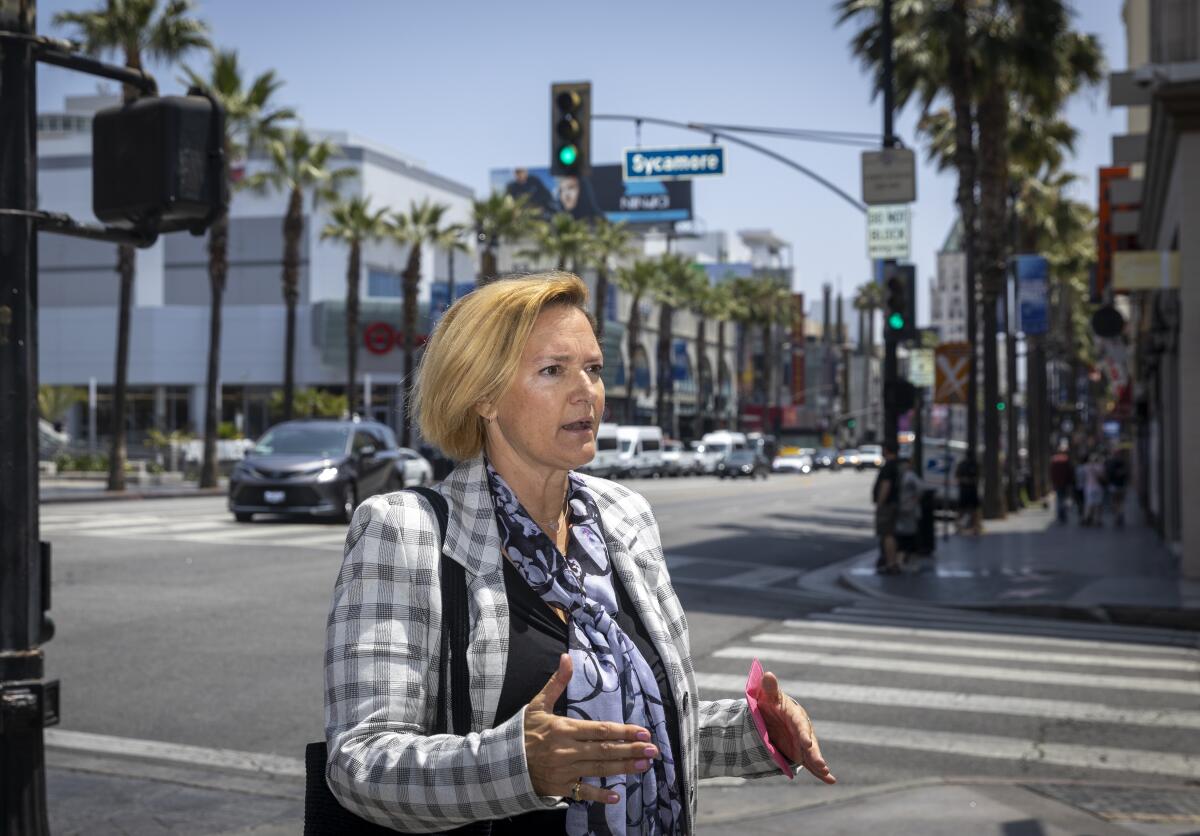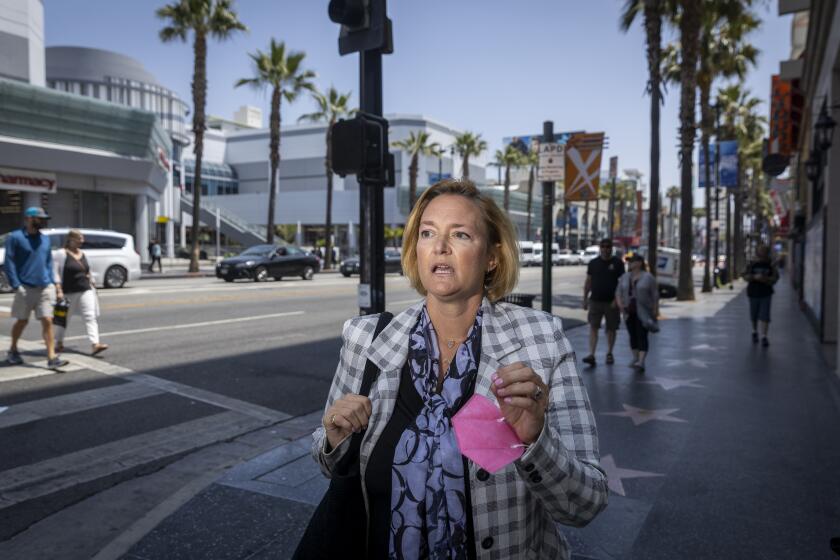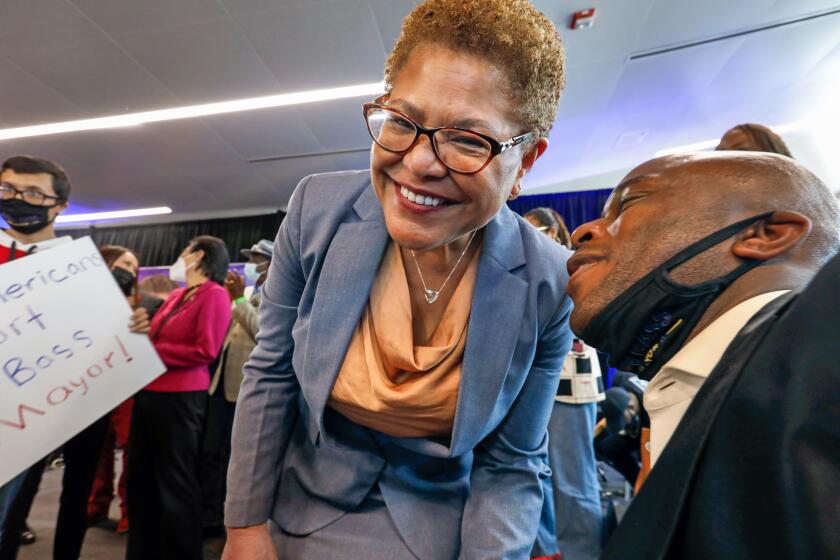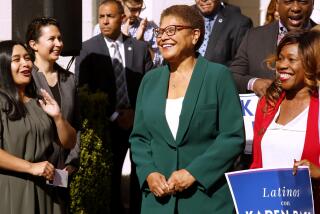With a new left rising in L.A., can Karen Bass win over backers of activist Gina Viola?

Two weeks after Los Angeles’ mayoral primary, Gina Viola issued something of a challenge to Rep. Karen Bass.
A community activist and small-business owner, Viola was virtually unknown to voters prior to launching her own long-shot bid. But her grassroots campaign quickly amassed support from leftists disenchanted by the more mainstream candidates.
She finished fourth with nearly 7% of the vote — less than a percentage point behind Councilman Kevin de León, who outspent her more than 77 to 1.
Viola’s backers hailed her primary showing as a message to the establishment, revealing a not insignificant vein of support for a candidate who would like to raise the minimum wage to $39 an hour and eventually abolish the Los Angeles Police Department.
Bass is headed to a November runoff against real estate developer Rick Caruso, whom she bested by more than 7 percentage points in the primary. As the vote count solidified, Viola put out a statement in mid-June that was part invitation and part broadside.
She made clear that she and her supporters could be willing to rally behind Bass in the general election, but they would require serious concessions. The letter also took a number of swipes at the congresswoman, accusing her of allowing the “know-nothing consultant class” to dictate Angeleno politics to her and placating the powerful union that represents rank-and-file Los Angeles police officers.
“Our door is open, Congresswoman,” Viola wrote. “But we can’t force you to walk through it.”
Gina Viola is the only candidate in the L.A. mayor’s race calling for a halt to LAPD hiring, and shifting funds to social services.
Bass does not plan to change her positions, her campaign said, and Viola has characterized certain parts of the congresswoman’s platform as “deal breakers” for her and her supporters.
An endorsement does not appear to be immediately forthcoming, and Viola repeatedly called Bass out on Twitter over the last week.
The question now is whether the city’s far-left voters will rally behind Bass in the general election, or potentially sit out a head-to-head matchup between a centrist former Republican businessman and a relatively progressive candidate who would make history as the city’s first Black female mayor.
Mike Bonin, one of the most progressive members of the City Council and a Bass endorser, characterized primary and general elections as two very different beasts.
“The primary is where you’re looking to choose the candidate who reflects your views as close to 100% as you possibly can,” whereas the general is a more stark choice between two candidates, Bonin said.
The electoral math between a primary and a general election is also not 1 to 1. General elections tend to have higher turnout, meaning Bass and Caruso won’t just be competing to pull votes from each other and the other 10 candidates who were on the primary ballot. They’ll also be scrambling to activate — and win over — a new set of voters who stayed home in June.
De León, the third-place finisher, also has yet to endorse in the general. But even if he backs Bass, it’s likely that a share of his largely Latino base — a demographic heavily courted by Caruso — will move to the developer come November.
Bill Przylucki — executive director of Ground Game LA, a prominent grassroots organization that endorsed Viola — doubted any significant number of Viola voters will flock to Caruso.
“This is not the Bernie-Hillary-Trump equation,” Przylucki said, referencing the Bernie Sanders primary supporters who ultimately marked ballots for Donald Trump instead of Democratic candidate Hillary Clinton in the 2016 general election.
Viola voters will more plausibly choose between backing Bass or not casting a vote for mayor, he hypothesized.
“Congresswoman Bass is running an inclusive campaign that welcomes the support of all Angelenos, and will fight to win votes in every corner of this city,” spokesperson Anna Bahr said, citing Bass’ organizing work, state Assembly leadership and time in Congress as evidence of her “ability to build consensus and deliver results.”
Bass has blended activism and pragmatism throughout her career, evolving from South L.A. community organizer to elected official known for coalition building in both Sacramento and Washington. Her politics and long history of movement work would qualify her as a progressive in much of the city. But there is a wide gulf between her positioning and Viola’s.
The fault lines in the L.A. political left echo broader internal dissension in the Democratic Party about the definition of a progressive, and what kind of policies can win elections.
“I think there’s a young cohort of voters who are pushing to redefine what progressive means for leadership in the city of Los Angeles,” said Sara Sadhwani, an assistant professor of politics at Pomona College.
That was clear in the June primary’s council races, where Eunisses Hernandez — who, like Viola, is a self-described police abolitionist — ousted incumbent Councilman Gil Cedillo to represent a northeast Los Angeles district. In two other council races that will be decided in fall runoffs, the first-place finishers were also progressives backed by some of the groups that endorsed Viola.
The critiques of Bass from the left — which spurred Viola to enter the race in the first place — primarily center on homelessness and policing.
Bass has struck a delicate balance on public safety. She led the effort to pass a major police reform bill that ultimately stalled out in the Senate last year. Her platform emphasizes crime prevention and community investment, while also pledging to restore the LAPD to its authorized size of more than 9,700 officers. (Caruso, the candidate endorsed by the Los Angeles Police Protective League, wants to hire 1,500 additional cops.)
Rep. Karen Bass is facing criticism from the left over her positions on homelessness and crime, with prominent activists putting her on notice.
“Congresswoman Bass has spent decades fighting for police reform — which is exactly why the police union spent $4 million against her in the primary election. Her record on this issue is clear: Her leadership on the George Floyd Justice in Policing Act led President Biden to sign the most far-reaching executive order on police reform in American history,” Bahr said.
Viola, who described herself as “the infamous defund-the-police candidate” on a debate stage, would like to see the department winnow its ranks over time by not hiring new officers and redirecting that money toward social services.
Viola also has said her supporters are “not going to budge on 41.18,” referring to a controversial law that restricts where homeless people can camp.
Bass has raised issues with the balkanized nature of the law, which requires individual council members to seek enforcement in their districts. But she has said she would not repeal it.
Viola’s 44,341 votes are hardly insignificant. If, for instance, Bass had converted all of Viola’s voters in the primary, the congresswoman would have received 49.97% support — a hair’s breadth under the 50% necessary to win outright and avoid a runoff entirely.
Viola drew support from leaders of Black Lives Matter-Los Angeles and was endorsed by a number of grassroots groups in the primary.
The community activist said that, as things stand, she worries “a lot” of her voters will sit out the mayoral race in November.
But she also urged her supporters to attend an anti-Caruso rally last week — a stance that would seemingly imply voting in the November election.
“What I’ll be saying between now and November is look at the difference between Rick Caruso and Karen Bass and think about how each of them would respond as mayor to a strong progressive bloc of four or five council members, which hasn’t existed previously,” Bonin said.
Bass would be likely to build coalitions and support legislation written by that bloc, whereas Caruso would be likely to oppose it, he said.
Hernandez will soon join that progressive bloc, though the size of its membership will ultimately be determined by November runoff races. The incoming council member declined to say who she voted for in the primary, beyond noting that her and Viola’s positions were aligned. But she said she would absolutely vote in the mayoral general.
“I think there’s going to be a lot of pushback and it’s not going to be smooth sailing until the general,” Hernandez said. But, she said, “I don’t think people are going to sit this one out.”
At the small anti-Caruso rally on Friday, Viola supporter Taina Vargas said she ultimately planned to vote for Bass in the general, despite her concerns with the candidate’s public safety platform.
But the rally’s organizer, Katherine Tattersfield, was less convinced. Tattersfield, who was active in Viola’s campaign, said her decision would depend on how Bass responded to Viola’s open letter. She might still “write in Gina Viola” in November, she said.
Viola hasn’t ruled out a write-in candidacy, saying that — as with her endorsement — any decision would be made in concert with Black Lives Matter-Los Angeles organizers.
“It’s so hard because if the movement then asks me to run as a write-in candidate, I can’t imagine saying no to the movement,” Viola said.
When asked whether urging Viola to mount a write-in candidacy was under consideration, BLM-LA co-founder Melina Abdullah said, “everything’s on the table, and it just depends on how things play out.”
More to Read
Sign up for Essential California
The most important California stories and recommendations in your inbox every morning.
You may occasionally receive promotional content from the Los Angeles Times.













